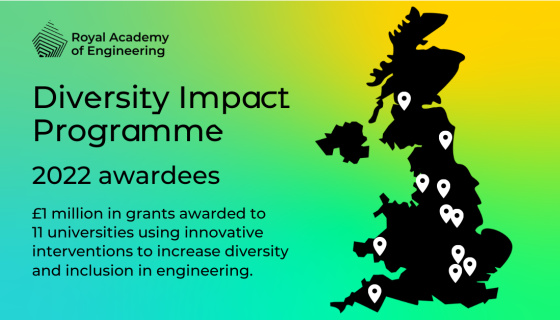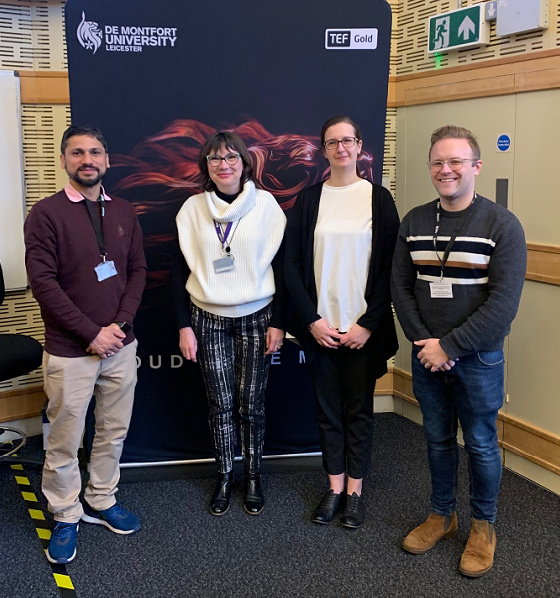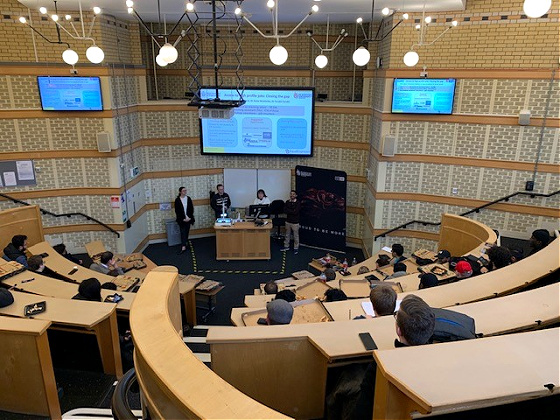An ambitious De Montfort University Leicester (DMU) project to transform the outcomes of engineering students from diverse backgrounds has been awarded £95,306 by a national initiative.

Launched by the Royal Academy of Engineering (RAEng), the Diversity Impact Programme has provided grants of up to £100,000 for 11 innovative new projects addressing the unequal outcomes experienced by students from underrepresented groups, over the course of 12-18 months.
DMU’s School of Engineering and Sustainable Development (ESD) is behind one of the funded projects across the UK, spearheaded by head of school Professor Ljiljana Marjanovic-Halburd, together with senior lecturers Dr Anna Strzelecka and Dr Farukh Farukh.
The project will establish an Engineering Sciences Learning Centre and Employability Programme, co-designed and co-run with students, that will reinforce their academic and professional confidence in pursuing high profile engineering careers.
The student-oriented centre will provide a range of activities that will help to close the existing, as well as perceived, skills gap between students from underrepresented groups and their peers.

From left to right: Dr Farukh, Professor Marjanovic-Halburd, Dr Strzelecka, and founder and managing director of Equal Engineers Dr Mark McBride-Wright
It will also offer students structured support outside of core teaching hours to boost their confidence, as well as work with industry partners to prepare them for future employment.
Dr Strzelecka said: “We’re so grateful for this generous grant. It will enable us to set up our first-year students for success by levelling up their diverse range of maths, programming, physics and design knowledge, all of which contribute to the basic principles of engineering.
“The project will give second and final-year students the chance to act as mentors, as well as to contribute to the development of learning materials and teaching methods, providing invaluable peer-to-peer interactions.
“We will also run employability events to ensure students gain the exposure and training they need to show them that the industry isn’t a scary place. We want them to learn from our successful alumni that if they apply themselves they too can succeed, because research clearly shows that you have to be exposed to role models in order to aspire and achieve.”
Dr Farukh said: “The UK was already struggling with a critical skills shortage in engineering and the Covid-19 pandemic has aggravated the situation. If we want to remain competitive, we must act now by addressing these skills needs and by employing diversity, equity and inclusion in the workforce - something this timely funded project will enable us to do.”

Students and staff attending DMU's project launch
Professor Marjanovic-Halburd said: “Our project will go beyond supporting students to focus on staff as well. We will work with Equal Engineers to increase staff confidence and break down barriers to success wherever they can exist.
“Dr Strzelecka, Dr Farukh and I will be trained so that we can pass the baton on to existing and new colleagues, to ensure the sustainability of our project, as well as the academic and professional success of our staff.”
DMU’s project was rewarded for presenting a bold, transformative vision for the future. It also met RAEng’s criteria for recognising systemic issues affecting diversity and inclusion, demonstrating commitment from senior leaders beyond the grant period, and being led by a diverse team.
Dr Hayaatun Sillem CBE, Chief Executive of RAEng, said: “Our goal is to help universities to develop interventions, informed by evidence, that transform the outcomes of students from diverse and underrepresented backgrounds. It is vital that we seek innovative and creative ways to accelerate the pace of change rather than accepting that incremental improvement is all that is possible.
“There is an extensive evidence base supporting the benefits of diverse teams working in inclusive cultures but there is still a way to go in understanding how to deliver the culture of inclusion that unlocks the power of diversity. These projects will give us invaluable insights and experience that will be shared across the higher education community so that we can work collectively to drive positive change”.
DMU’s project is directly informed by the university’s Access Participation Plan, which identified access to highly paid jobs as the number one priority for students. More than half of ESD students are Black, Asian and minority ethnic, yet they are underrepresented in high profile employment.
These students come from a diverse range of backgrounds and qualifications, and often struggle with their performance which affects their confidence. This is amplified by the fact that a third of these students come from disadvantaged backgrounds and almost half of them are the first generation studying for a university degree.
Posted on Monday 4 April 2022